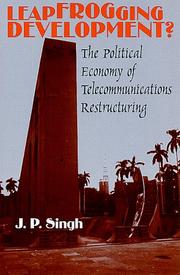| Listing 1 - 10 of 21 | << page >> |
Sort by
|

ISBN: 0791442942 0585282846 9780585282848 0791442934 1438420153 Year: 1999 Volume: *4 Publisher: Albany : State University of New York Press,
Abstract | Keywords | Export | Availability | Bookmark
 Loading...
Loading...Choose an application
- Reference Manager
- EndNote
- RefWorks (Direct export to RefWorks)
"Telecommunications restructurings are now seen as important barometers in the shift among developing countries toward market-based economies. They are often posited as helping developing countries "leapfrog," or accelerate their pace of development, and "connect" with the world economy. Leapfrogging Development? shows that most states in developing countries are unable to resolve the myriad pressures they face in restructuring important sectors like telecommunications to effect accelerated or "leapfrogging" development."--Jacket. "After examining seven cases (Singapore, South Korea, Mexico, Malaysia, China, Brazil, Myanmar), the book examines India as in in-depth "crucial case." Leapfrogging Development? proposes a unique framework that shows how groups and coalitions articulate development preferences and how, in response, different types of states respond to or shape these preferences."--Jacket.
Telecommunication policy --- Telecommunication --- Telecommunication and state --- Government policy --- Case studies --- E-books
Book
ISBN: 9780415491136 9780415491143 9780203838587 0415491142 0415491134 9781136878602 9781136878640 9781136878657 Year: 2011 Publisher: Abingdon Routledge
Abstract | Keywords | Export | Availability | Bookmark
 Loading...
Loading...Choose an application
- Reference Manager
- EndNote
- RefWorks (Direct export to RefWorks)
#SBIB:327.7H130 --- United Nations. --- Verenigde Naties: gespecialiseerde instellingen (UNESCO, FRO, OIT, ...) --- Unesco --- Unesco. --- Organisation des Nations Unies pour l'éducation, la science et la culture --- Organización de las Naciones Unidas para la educación, la ciencia y la cultura --- United Nations educational, scientific and cultural organization --- Verenigde Naties. Organisatie voor onderwijs, wetenschap en cultuur --- UNESCO. --- Education and state --- Science and state --- Cultural policy --- Education --- Politique scientifique et technique --- Politique culturelle --- International cooperation --- Politique gouvernementale --- Coopération internationale --- History --- History. --- ユネスコ --- 国際連合教育科学文化機関
Book
ISBN: 1107190479 0511479832 9786612001499 1282001493 0511551916 0511477430 0511480636 0511475985 051147895X 9780511479830 9780511480638 9780511551918 0521515319 0521731089 9780521515313 9780521731089 Year: 2008 Publisher: Cambridge, UK Cambridge University Press
Abstract | Keywords | Export | Availability | Bookmark
 Loading...
Loading...Choose an application
- Reference Manager
- EndNote
- RefWorks (Direct export to RefWorks)
What role do diplomacy and negotiations play in economic globalization? Many argue that great powers shape diplomacy to their advantage, others that, in a 'flat world', diplomacy helps everyone. Going beyond these polarized views, this book explores the conditions under which negotiations matter and the ways in which diplomacy is evolving in the global commercial arena. J. P. Singh argues that where there is a diffusion or decentralization of power among global actors, diplomacy can be effective in allowing the adjustment of positions so that mutual gains will result. In contrast, when there is a concentration of power, outcomes tend to benefit the strong. There will be little alteration in perception of interest, and coercion by strong powers is common. Singh's book suggests that there are possibilities for transformational problem-solving through multilateral diplomacy. Empirically, the book examines the most important information-age trade issues.
Negotiation in business. --- Information technology --- Negotiation. --- Bargaining --- Dickering --- Haggling --- Higgling --- Negotiating --- Negotiations --- Discussion --- Psychology, Applied --- Business --- Management --- Economic aspects. --- Social Sciences --- Political Science
Book
ISBN: 1283135973 9786613135971 0231519192 9780231519199 9780231147194 0231147198 9780231147187 023114718X Year: 2011 Publisher: New York Columbia university press
Abstract | Keywords | Export | Availability | Bookmark
 Loading...
Loading...Choose an application
- Reference Manager
- EndNote
- RefWorks (Direct export to RefWorks)
Our interactive world can take a creative product, such as a Hollywood film, Bollywood song, or Latin American telenovela, and transform it into a source of cultural anxiety. What does this artwork say about the artist or the world she works in? How will these artworks evolve in the global market? Film, music, television, and the performing arts enter the same networks of exchange as other industries, and the anxiety they produce informs a fascinating area of study for art, culture, and global politics.Focusing on the confrontation between global politics and symbolic creative expression, J. P. Singh shows how, by integrating themselves into international markets, entertainment industries give rise to far-reaching cultural anxieties and politics. With examples from Hollywood, Bollywood, French grand opera, Latin American television, West African music, postcolonial literature, and even the Thai sex trade, Singh cites not only the attempt to address cultural discomfort but also the effort to deny entertainment acts as cultural. He connects creative expression to clashes between national identities, and he details the effect of cultural policies, such as institutional patronage and economic incentives, on the making and incorporation of art into the global market. Ultimately, Singh shows how these issues affect the debates on cultural trade being waged by the World Trade Organization, UNESCO, and the developing world.
Arts and globalization. --- Culture and globalization. --- Arts --- Globalization and culture --- Globalization --- Globalization and the arts --- Political aspects. --- Economic aspects. --- Arts and globalization --- Culture and globalization --- #SBIB:316.7C200 --- #SBIB:39A5 --- Economic aspects --- Political aspects --- Sociologie van de cultuuruitingen: algemeen --- Kunst, habitat, materiële cultuur en ontspanning --- Arts - Political aspects --- Arts - Economic aspects
Book
ISBN: 9781503601055 1503601056 9780804794121 080479412X 9781503601048 1503601048 Year: 2016 Publisher: Stanford, California
Abstract | Keywords | Export | Availability | Bookmark
 Loading...
Loading...Choose an application
- Reference Manager
- EndNote
- RefWorks (Direct export to RefWorks)
Developed nations strive to create the impression that their hearts and pockets bleed for the developing world. Yet, the global North continues to offer unfavorable trade terms to the global South. Truly fair trade would make reciprocal concessions to developing countries while allowing them to better their own positions. However, five hundred years of colonial racism and post-colonial paternalism have undermined trade negotiations. While urging developing countries to participate in trade, the North offers empty deals to "partners" that it regards as unequal. Using a mixed-methods approach, J. P. Singh exposes the actual position beneath the North's image of benevolence and empathy: either join in the type of trade that developed countries offer, or be cast aside as obstreperous and unwilling. Singh reveals how the global North ultimately bars developing nations from flourishing. His findings chart a path forward, showing that developing nations can garner favorable concessions by drawing on unique strengths and through collective advocacy. Sweet Talk offers a provocative rethinking of how far our international relations have come and how far we still have to go.
International economic relations --- Paternalism --- Parentalism --- Social classes --- Social control --- Social systems --- Economic policy, Foreign --- Economic relations, Foreign --- Economics, International --- Foreign economic policy --- Foreign economic relations --- Interdependence of nations --- International economic policy --- International economics --- New international economic order --- Economic policy --- International relations --- Economic sanctions --- Developing countries --- Developed countries --- Advanced countries --- Advanced nations --- Developed nations --- Economically advanced countries --- Economically advanced nations --- First World --- Industrial countries --- Industrial nations --- Industrial societies --- Industrialized countries --- Industrialized nations --- Western countries --- Emerging nations --- Fourth World --- Global South --- LDC's --- Least developed countries --- Less developed countries --- Newly industrialized countries --- Newly industrializing countries --- NICs (Newly industrialized countries) --- Third World --- Underdeveloped areas --- Underdeveloped countries --- E-books --- International economic relations. --- Paternalism.
Book
Year: 1997 Publisher: Westerville American ceramic society
Abstract | Keywords | Export | Availability | Bookmark
 Loading...
Loading...Choose an application
- Reference Manager
- EndNote
- RefWorks (Direct export to RefWorks)
Book
Year: 1982 Publisher: New Delhi Inter-India publications
Abstract | Keywords | Export | Availability | Bookmark
 Loading...
Loading...Choose an application
- Reference Manager
- EndNote
- RefWorks (Direct export to RefWorks)

ISBN: 1574980955 Year: 2000 Publisher: Westerville American ceramic society
Abstract | Keywords | Export | Availability | Bookmark
 Loading...
Loading...Choose an application
- Reference Manager
- EndNote
- RefWorks (Direct export to RefWorks)
Ceramic materials --- Ceramics --- Composite materials --- Glass
Book
Year: 1997 Publisher: Westerville American ceramic society
Abstract | Keywords | Export | Availability | Bookmark
 Loading...
Loading...Choose an application
- Reference Manager
- EndNote
- RefWorks (Direct export to RefWorks)
Book
ISBN: 1503612708 9781503612709 9781503612686 9781503612693 Year: 2020 Publisher: Stanford, California
Abstract | Keywords | Export | Availability | Bookmark
 Loading...
Loading...Choose an application
- Reference Manager
- EndNote
- RefWorks (Direct export to RefWorks)
The backlash against globalization and the rise of cultural anxiety has led to considerable re-thinking among social scientists. This book provides multiple theoretical, historical, and methodological orientations to examine these issues. While addressing the rise of populism worldwide, the volume provides explanations that cover periods of both cultural turbulence and stability. Issues addressed include populism and cultural anxiety, class, religion, arts and cultural diversity, global environment norms, international trade, and soft power. The interdisciplinary scholarship from well-known scholars questions the oft-made assumption in political economy that holds culture "constant," which in practice means marginalizing it in the explanation. The volume conceptualizes culture as a repertoire of values and alternatives. Locating human interests in underlying cultural values does not make political economy's strategic or instrumental calculations of interests redundant: the instrumental logic follows a social context and a distribution of cultural values, while locating forms of decision-making that may not be rational.
Economics --- Culture --- Politics and culture. --- Political aspects. --- Economic aspects. --- cultural stability. --- cultural toolkits. --- cultural values. --- ideology. --- interest formation. --- moral values. --- political economy. --- populism. --- preferences. --- rational choice.
| Listing 1 - 10 of 21 | << page >> |
Sort by
|

 Search
Search Feedback
Feedback About UniCat
About UniCat  Help
Help News
News